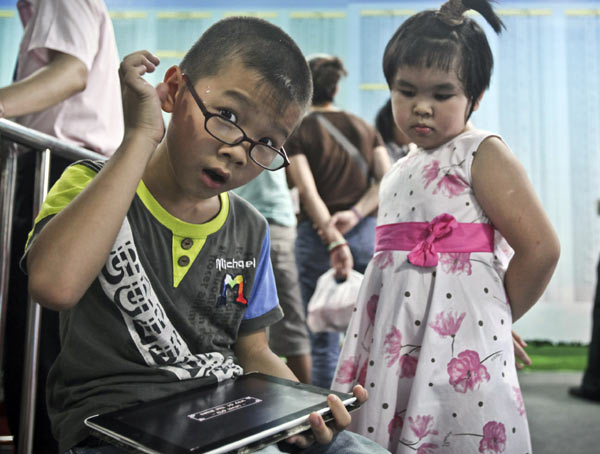
Survey director: Digital devices changing how children think
Digital devices are playing an increasing role in children's development after school, according to a survey released on Wednesday.
 |
|
A boy plays with a tablet while waiting for his parents at a sales office in Guangzhou, South China's Guangdong province. Provided to China Daily |
More than half of respondents have cell phones and up to 67 percent regularly use iPads for entertainment, the survey said.
In the survey, conducted in March and April, more than 5,000 students from 50 primary schools and youth centers in Guangzhou, Guangdong province, were asked about their new media habits.
"In an era of mass information, children are now living in an environment of diversified media. They have easy access to emerging media devices such as iPads and cell phones," said Zhang Haibo, of the Guangzhou working committee of China Young Pioneers, a youth organization for Chinese children ages 6 to 14.
Zhang, who directed the survey, urged parents to pay more attention to the "Apple generation" phenomenon, which refers to the rising popularity of electronic media among children.
"Compared with traditional media such as newspapers and television, digital media can easily harm children because they cannot judge whether or not the things they encounter there are appropriate for them," Zhang told China Daily.
According to the survey, up to 90 percent of children regularly use entertainment applications such as Fruit Ninja and Angry Birds on iPads and cell phones.
Eighty-two percent of respondents log onto the Internet daily, and 84 percent have used QQ, a popular Chinese instant messenger. More than half of respondents have used micro blogs on Sina Weibo and Tencent.
"Unlike their parents, who depend a lot on newspapers and television to gather information, children have developed great interest in new media, which also definitely changes their thinking and ways of studying and social communication," Zhang said.
Twenty-seven percent of survey respondents said the Internet has become a reliable source of information to supplement their studies.
"I like to go online to learn because the things you find there have a fun way of teaching," said Lin Qiucheng, an 8-year-old student at Nanwu Primary School.
Li Juan, the mother of a 4-year-old daughter, said it is hard for parents to avoid using new media applications in front of children.
"We know it's not good for children to use digital gadgets. But they easily learn how to use them. That makes me sad because my daughter doesn't have many friends in such a lonely society," she said.
The kindergarten Li's daughter attends has "golden pad" items, similar to Apple's iPad, for children to use in class.
Liu Xuemei, a teacher at Nanwu Primary School, said that instead of barring children from digital media, parents should give children more guidance in using them safely.
"Parents and teachers should show children the right way to use the iPad. They shouldn't just be passive recipients," he said.
To better provide entertainment facilities for children, local authorities started setting up youth centers in residential communities, said Yang Jundong, director of the Guangzhou Children's Palace, a public facility where children can engage in extracurricular activities.
"The youth centers in residential communities enable children to better enjoy specially designed public education and entertainment," Yang said.
Some 30 new experimental centers will be built this year, according to Yang.
"We will promote teaching methods we have developed and provide more entertainment facilities in these community 'palaces'. Underprivileged children and kids left behind by migrant-worker parents will be given free access to the program," Yang said.
qiuquanlin@chinadaily.com.cn







